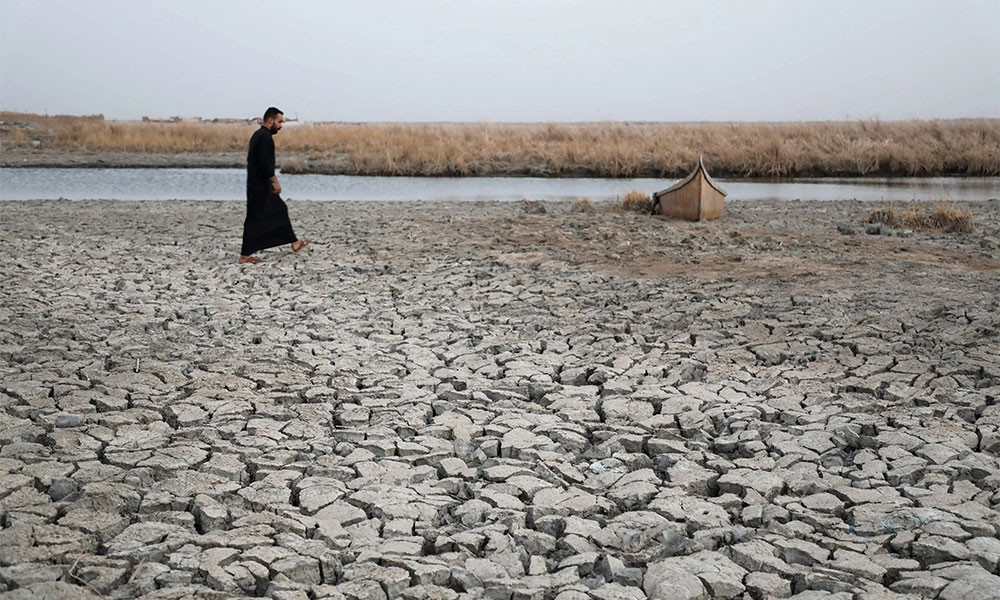 气候变化只是世界面临的危机之一。图片来源:ASAAD NIAZI/AFP VIA GETTY IMAGES
气候变化只是世界面临的危机之一。图片来源:ASAAD NIAZI/AFP VIA GETTY IMAGES经济、政治和生态方面多重冲击并存,将在未来十年撼动全球,而世界各国正在奋起直追应对这些冲击。
未来十年将是世界经济的转型期,世界经济正在面临一系列相互影响的危机带来的威胁。资深经济学家、著名的悲观主义者努里埃尔·鲁比尼因为其对未来的悲观预测而被称为末日博士,他在最近出版的《超级威胁》(Megathreats)一书中列出了10大重大经济挑战,从空前的债务混乱到全球气候异常。
世界各国曾经各自为战,应对这些危机,但包括鲁比尼和经济史学家亚当·图兹在内的专家们担心,这些威胁可能会演变成重大的“多重危机”,即多重危机交织在一起,使得集体影响带来的风险上升。现在,世界上最重要的国际商业和政治合作论坛之一也认为,我们正处于这样一场危机的边缘。
世界经济论坛(World Economic Forum)最新发布的一份全球风险报告显示,尽管全球各国政府和商界领袖都在奋起直追,应对通胀上升和衰退风险等短期挑战,但长期风险可能会在2030年前演变成一场多重危机。
世界经济论坛的常务董事萨阿迪亚·扎赫迪在报告的序言里写道:“全世界都聚焦如何在当今的危机中‘幸存下来’。然而,注意力和资源却被转移到新出现的或迅速加剧的风险上。”
长期威胁
该报告于1月11日在世界经济论坛下周于瑞士达沃斯举行的经济和政治领导人年度会议之前发布,采访了1,200名与世界经济论坛有关的全球风险专家,他们来自学术界、商界和政界。专家们就他们对未来十年世界面临的主要短期和长期风险的看法接受了采访。
虽然诸如生活成本上升、经济增长缓慢、全球粮食和能源供应紧张等问题被列为紧迫的短期全球风险,但报告发现,长期威胁主要集中在生态危机上。
未来十年最紧迫的四大长期风险是减缓气候变化举措无效、难以适应气候变化、极端天气事件,以及生物多样性崩溃带来的威胁。世界经济论坛说,如果不解决这些问题,短期和长期风险就可能结合在一起,造成集体危机,而这是世界各国领导人还没有做好准备应对的。
报告称:“这些当前和未来的风险也可能相互作用,形成‘多重危机’——具有复合效应的相关全球风险,其整体影响将超过各个部分的总和。”
“多重危机”时代
世界经济论坛的报告增加了对人类在未来十年可能面临的集体风险的警告,这样的警告声日益高涨。
图兹甚至普及了“多重危机”一词,指的是错综复杂的危机网络。这些危机一旦同时出现,那么解决所有危机就会变得非常困难。2022年,他在英国《金融时报》(Financial Times)的一篇专栏文章中宣布了多重危机时代的到来,并警告称,地缘政治危机加上全球生态崩溃带来的威胁只是开端。
由于孤立主义占据了上风,全球合作变得更加难以维持,图兹写道:“如今我们如履薄冰,未来只会变得更加不稳定,更让人神经紧绷。”
世界经济论坛的报告同样指出,虽然全球合作通常是抵御全球风险的“护栏”,但在21世纪20年代上半叶,中美紧张局势和俄乌冲突引起的地缘政治变化冲击了国际关系,让应对气候变化和促进全球发展难上加难,而这时候正是最需要和平稳定国际关系的时候。
世界经济论坛说,俄乌冲突引发了全球粮食和能源短缺,加剧了全球通货膨胀,也使许多政府的工作重点转向应对短期风险。报告警告称,长期风险因此受到的关注相对较少,这加剧了多重危机带来的风险。
报告说:“在未来几年,随着多重危机持续加剧,经济和地缘政治格局将发生结构性变化,这将加剧我们面临的其他风险。”(财富中文网)
译者:中慧言-王芳
经济、政治和生态方面多重冲击并存,将在未来十年撼动全球,而世界各国正在奋起直追应对这些冲击。
未来十年将是世界经济的转型期,世界经济正在面临一系列相互影响的危机带来的威胁。资深经济学家、著名的悲观主义者努里埃尔·鲁比尼因为其对未来的悲观预测而被称为末日博士,他在最近出版的《超级威胁》(Megathreats)一书中列出了10大重大经济挑战,从空前的债务混乱到全球气候异常。
世界各国曾经各自为战,应对这些危机,但包括鲁比尼和经济史学家亚当·图兹在内的专家们担心,这些威胁可能会演变成重大的“多重危机”,即多重危机交织在一起,使得集体影响带来的风险上升。现在,世界上最重要的国际商业和政治合作论坛之一也认为,我们正处于这样一场危机的边缘。
世界经济论坛(World Economic Forum)最新发布的一份全球风险报告显示,尽管全球各国政府和商界领袖都在奋起直追,应对通胀上升和衰退风险等短期挑战,但长期风险可能会在2030年前演变成一场多重危机。
世界经济论坛的常务董事萨阿迪亚·扎赫迪在报告的序言里写道:“全世界都聚焦如何在当今的危机中‘幸存下来’。然而,注意力和资源却被转移到新出现的或迅速加剧的风险上。”
长期威胁
该报告于1月11日在世界经济论坛下周于瑞士达沃斯举行的经济和政治领导人年度会议之前发布,采访了1,200名与世界经济论坛有关的全球风险专家,他们来自学术界、商界和政界。专家们就他们对未来十年世界面临的主要短期和长期风险的看法接受了采访。
虽然诸如生活成本上升、经济增长缓慢、全球粮食和能源供应紧张等问题被列为紧迫的短期全球风险,但报告发现,长期威胁主要集中在生态危机上。
未来十年最紧迫的四大长期风险是减缓气候变化举措无效、难以适应气候变化、极端天气事件,以及生物多样性崩溃带来的威胁。世界经济论坛说,如果不解决这些问题,短期和长期风险就可能结合在一起,造成集体危机,而这是世界各国领导人还没有做好准备应对的。
报告称:“这些当前和未来的风险也可能相互作用,形成‘多重危机’——具有复合效应的相关全球风险,其整体影响将超过各个部分的总和。”
“多重危机”时代
世界经济论坛的报告增加了对人类在未来十年可能面临的集体风险的警告,这样的警告声日益高涨。
图兹甚至普及了“多重危机”一词,指的是错综复杂的危机网络。这些危机一旦同时出现,那么解决所有危机就会变得非常困难。2022年,他在英国《金融时报》(Financial Times)的一篇专栏文章中宣布了多重危机时代的到来,并警告称,地缘政治危机加上全球生态崩溃带来的威胁只是开端。
由于孤立主义占据了上风,全球合作变得更加难以维持,图兹写道:“如今我们如履薄冰,未来只会变得更加不稳定,更让人神经紧绷。”
世界经济论坛的报告同样指出,虽然全球合作通常是抵御全球风险的“护栏”,但在21世纪20年代上半叶,中美紧张局势和俄乌冲突引起的地缘政治变化冲击了国际关系,让应对气候变化和促进全球发展难上加难,而这时候正是最需要和平稳定国际关系的时候。
世界经济论坛说,俄乌冲突引发了全球粮食和能源短缺,加剧了全球通货膨胀,也使许多政府的工作重点转向应对短期风险。报告警告称,长期风险因此受到的关注相对较少,这加剧了多重危机带来的风险。
报告说:“在未来几年,随着多重危机持续加剧,经济和地缘政治格局将发生结构性变化,这将加剧我们面临的其他风险。”(财富中文网)
译者:中慧言-王芳
Multiple concurrent economic, political, and ecological shocks are converging to rock the globe in the next decade, and the world is playing catch-up to address them.
The next 10 years are shaping up to be a transformational period for the world economy, which is under threat from a number of interrelated crises. The veteran economist and well-known pessimist Nouriel Roubini, also known as Dr. Doom for his gloomy forecasts of the future, broke down 10 massive economic challenges in his recent book Megathreats, ranging from unprecedented debt chaos to global climate disruption.
The world has faced each of these crises individually before, but experts including Roubini and economic historian Adam Tooze fear that these threats could morph into a singular “polycrisis,” a state of risk where multiple crises intersect to amplify their collective impact. And now one of the world’s premier forums for international business and political cooperation agrees we are on the brink of such a crisis.
While governments and business leaders around the world are racing to meet short-term challenges such as rising inflation and recession risks, long-term risks may converge into a polycrisis by the end of the decade according to a new report on global risks by the World Economic Forum.
“The world’s collective focus is being channeled into the ‘survival’ of today’s crises,” the WEF’s managing director Saadia Zahidi wrote in a preface to the report. “Yet much-needed attention and resources are being diverted from newly emerging or rapidly accelerating risks.”
Long-term threats
The report, released on January 11 ahead of the WEF’s annual conference of economic and political leaders in Davos, Switzerland, next week, interviewed 1,200 global risk experts associated with the WEF hailing from academia, business, and politics. Experts were surveyed on their views regarding major short- and long-term risks facing the world in the decade ahead.
While issues such as rising cost of living, slow economic growth, and tight global food and energy supplies rank as pressing short-term global risks, the report found that long-term threats primarily center on ecological crises.
The four most pressing long-term risks over the coming decade are failure to mitigate climate change, failure to adapt to climate change, extreme weather events, and the threat of biodiversity collapse. Left unaddressed, the WEF says, short- and long-term risks could combine to create a collective crisis world leaders may not be prepared for.
“These present and future risks can also interact with each other to form a ‘polycrisis’—a cluster of related global risks with compounding effects, such that the overall impact exceeds the sum of each part,” the report said.
The “polycrisis” era
The WEF’s report adds to a growing chorus of warnings about the collective risks humanity could face in the next decade.
Tooze even popularized the term “polycrisis” as a complex network of entangled crises that once put together make the task of addressing all of them significantly harder. He heralded the arrival of a polycrisis age in a Financial Times op-ed in 2022, warning that geopolitical crises combined with the threat of global ecological collapse were just the beginning.
“Our tightrope walk with no end is only going to become more precarious and nerve-racking,” he wrote, as isolationism takes hold and global cooperation becomes less tenable.
The WEF report made the same case that while global cooperation is normally a “guardrail” against global risks, geopolitical dynamics in the first half of the 2020s stemming from U.S.-China tensions and the Ukraine war threaten to weaken international ties to tackle climate change and global development when they are most needed.
The Ukraine war has also refocused many governments’ priorities toward short-term risks, the WEF said, by triggering global food and energy shortages while aggravating inflation worldwide. Long-term risks have consequently received relatively little attention, the report warned, contributing to the risk of a polycrisis.
“In the years to come, as continued, concurrent crises embed structural changes to the economic and geopolitical landscape, they accelerate the other risks that we face,” the report said.






